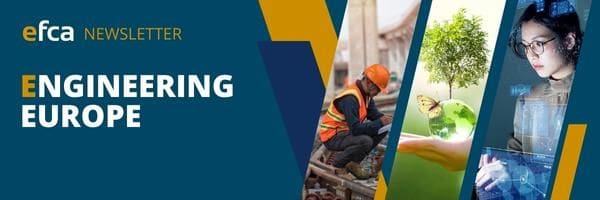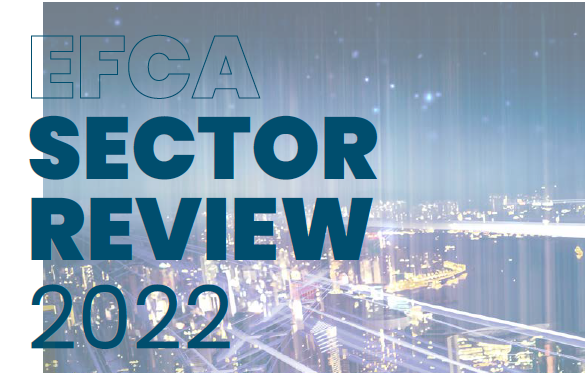
EFCA Newsletter 26 January 2023

Launch of EFCA Sector Review 2022
The EFCA Sector Review 2022 has just been published. This report demonstrates, amongst other things, how engineering services for construction are evolving, with strategic investments, including acquisitions, that will drive change towards a more climate resilient built environment. The top companies and groups operating in Europe are identified, based on their turnover in the region for engineering services for construction and the built environment. A snapshot of recent developments shows that Covid continued to impact supply chains and workers’ mobility in 2022. More positively, trends, including digitalisation, urbanisation and sustainability are stimulating growth in the sector. Read the full report here.
Assessing the future-readiness of consulting engineers
How future-ready are consulting engineers? How prepared for disruption, from digitalisation, sustainability and evolving regulation?
To find out. EFCA Future Trends Committee is conducting a survey, in partnership with the HHL Center for Strategy and Scenario Planning. The survey will assess the ability of consulting engineers to deal with disruption as well as reasons for any potential lack of future-readiness. The results will form the basis of a “playbook”- a tool to successfully navigate the future challenges facing our industry.
All respondents will receive the survey’s results as well as the playbook.
This initiative is the last in a three-phase series. The first was in 2021: Which way to go? Strategic scenarios for consulting engineers in times of high uncertainty. Last year saw the second, Seizing opportunities in times of disruption. How the consulting engineering industry can overcome the challenges of digitisation, harmonisation, and sustainability – a disruptive scenario analysis.
Participate in the survey here.
Digitalisation and sustainability: the view of young engineers
We need to succeed with the twin green and digital transitions to secure a sustainable future for present and future generations. This demands, among other things, skilled people and the use of digital technologies. The latter requires change and adaptation of work processes, re- and upskilling, as well as the ability to seize opportunities that come with new technology and cultural change. To understand where young engineers stand on digitalisation and sustainability across Europe, EFCA Future Leaders have launched a short survey, aimed at employees under the age of 40, of engineering consultancy companies. By understanding how young consulting engineers view the current state of digitalisation and sustainability across Europe, EFCA Future Leaders also aim to:
Provide knowledge on national performance to identify areas for further improvement
Initiate Europe-wide knowledge-sharing and learning from best practice
Provide transnational intelligence to the EFCA community, to support its concrete policy action
The results will be analysed and presented to the EFCA community at the next EFCA General Assembly Meeting in June. The findings will also be shared on the Future Leaders LinkedIn channel.
Participate in the survey here.
Single Market at 30
As the Single Market turns 30, the European Commission will host a number of events throughout the year, marking the anniversary of the creation of what has become the world’s largest common trading area. Operating on the basis of four fundamental freedoms: people, goods, services and capital, the Single Market has made it easier for the 27 Member States to trade on a level playing field and for citizens to live and work anywhere within EU borders. For the consulting engineering community, public procurement remains one of the most important aspects and EFCA’s Internal Market Committee continues to advocate for contracts that are awarded on the basis of the Most Economically Advantageous Tender. EFCA would like to see further improvements in the way contracts are awarded in the EU, including a greater focus on sustainability and digitalisation, enabling a more rapid completion of the twin green and digital transitions.
Further information is available here.
